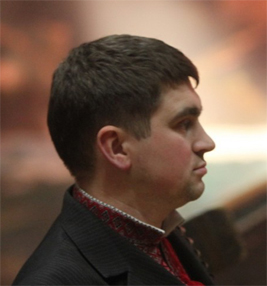Bank of Portraits / Yaniuk Rodion and Mykola

Yaniuk Rodion and Mykola
Rodion Yaniuk was born in 1900 in the village of Kotelianka, Polonne district of Kamianets-Podilsky (now Khmelnytsky) region, in a peasant family. The family was engaged in animal husbandry, raising pigs and cattle. In 1923, Rodion married Yevdokiya Brovchuk, who had a son, Ilarion, from a previous marriage. Later, the couple had three more sons: Hryhorii, Andrii, and Mykola.
The Yaniuks lived harmoniously, keeping friendly relations with Jewish families, of which there were about a dozen in the village. Rodion even engaged in trade jointly with Moisei Trybun, who had his own small business.
On July 6, 1941, German troops occupied the village of Kotelianka. Within a few days, most of the adult men of Jewish descent were taken from the settlement and shot near the neighboring village of Novoselytsya. The remaining Jews were sent to Polonne and placed in the ghetto at the site of the former granite quarry, where isolated residents built a water tower.
For this work, every day four or five carts with bricks headed from Kotelianka. Among the cart drivers was also Rodion Yaniuk. During these activities, he often met Moisei Trybun's daughters – Maria and Yevhenia (Manya and Zhenya). From the girls, he learned about the execution of their father. Most likely, he perished on September 2, 1941, when units of the police regiment "South" shot 2,100 Jews from Polonne and the surrounding area in the woods near the railway station, half a kilometer from the "Zagotzerno" grain harvesting office.
On June 25, 1942, the ghetto in Polonne was liquidated, and all its inhabitants (1,270 Jews) were executed.
In late June or early July 1942, an event occurred in the Yaniuk family that drastically changed their lives. Returning home from a collective farm, Rodion found the frightened and exhausted Manya and Zhenya Trybun in his house. They asked for shelter and help. Realizing the risk to himself and his family, Rodion and Yevdokiya Yanuk allowed the girls to stay in their home.
After a few months, neighbors learned about the presence of strangers in the Yaniuk household, someone reported the Kotelianka mayor on them. He went to carry out “serious conversation” with the rescuers together with the head of local collective farm in December 1942.
"They came into our house and said, 'So, Rodion, do you have bad people?' 'Yes,' father said, 'I do.' At that time, they [Manya and Zhenya] were sitting in the attic. Then the headman said, 'So that they are not here tomorrow!' Then they had dinner with us and left." From the testimony of Mykola Yaniuk. Polonne. 1993
For a while, the sisters were moved to the neighboring village of Derka to their mother’s aunt Maria. They left Kotelianka in the dark to avoid being seen by neighbors. Until sunrise, they hid in a haystack to cross the railroad during the day, which was guarded at night. In aunt Maria’s house, Manya and Zhenya Trybun lived for several weeks.
During this time, Rodion Yaniuk dug a pit for a shelter in the cellar, and near the chimney on the attic, he made a recess. When the girls returned, strict order and conspiration rules were introduced. Since then, one of them hid in the pit, and the other in the recess. They were allowed to go outside only from 10:00 to 12:00. At other times – no outings, especially beyond the homestead.
The Yaniuks fed everyone from their own garden. The presence of a cow significantly facilitated survival. Sometimes Rodion Yaniuk brought grain from the barn where he worked. The Jewish girls spent a year and seven months with the Yaniuks.
"I took care of the girls because my mother was ill. In the morning, they came out of their hiding places, helped clean the house, did the laundry for their things. They never went outside the house. Each had her own place and a bucket for the toilet. I was the cleaner. They didn't ask us for anything extra – what we ate, they ate. So they lived with us for a year and seven months until the Red Army liberated the village in January 1944. During this time, my mother and father were very worried, afraid that the Germans or the police might come and shoot everyone. But we acted as if there really was no one here". From the testimony of Mykola Yaniuk. Polonne. 1993
On January 8, 1944, German troops were driven out of the village of Kotelianka. After the immediate danger to the lives of the girls disappeared, they left the Yaniuks' house. According to Yad Vashem, Maria and Yevhenia Trybun joined the Soviet resistance movement in 1944 and stayed near Tiraspol in Moldova.
A month later, on February 10, 1944, Rodion Yaniuk was mobilized into the Red Army. In March–April 1944, he participated in the Proskuriv-Chernivtsi offensive operation, during which he missed in actions. To this day, the family does not know the place of his death or burial.
In the early 1990s, Maria and Yevhenia Trybun emigrated to Israel. Maria made every effort to recognize Mykola and his father as Righteous Among the Nations.
On December 20, 1994, Rodion Yaniuk (posthumously) officially received this title along with his son Mykola. Their names are engraved on the Wall of Honor on the Alley of the Righteous at Yad Vashem.
In 1999, the Extraordinary and Plenipotentiary Ambassador of the State of Israel to Ukraine, Anna Azari, during a solemn ceremony, awarded Mykola Yaniuk with the Medal and Certificate of the Righteous Among the Nations.

Vitaliy Horobets
Kyiv
National museum of the History of Ukraine in the Second World War
-
fingerprintArtefacts
-
theatersVideo
-
subjectLibrary







